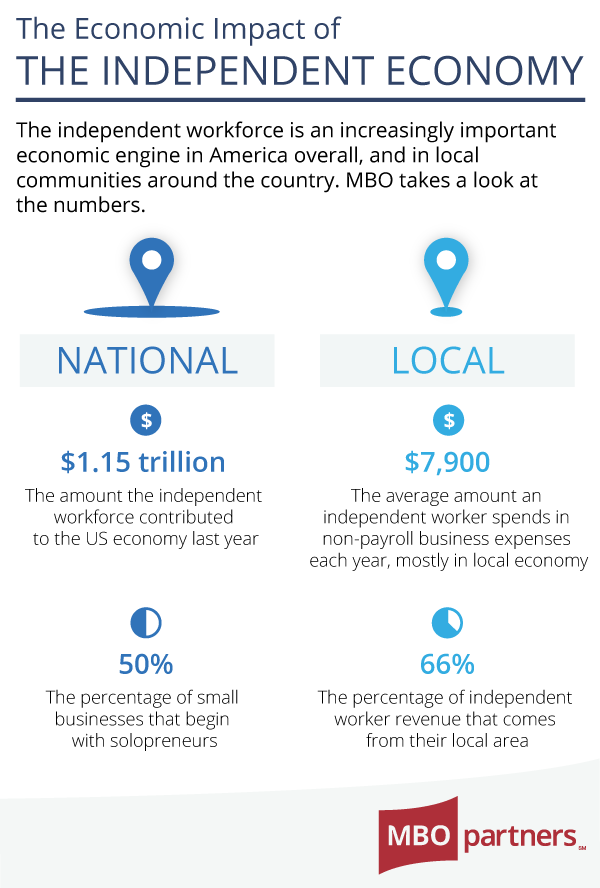To Solve the Gig Economy’s Woes, We Need a New Worker Classification

Plenty of employment prophets are proclaiming that the gig economy is the future of work – and when you look at the numbers, it’s hard to argue against these predictions. According to the U.S. Government Accountability Office, about 40 percent of U.S. workers hold contingent jobs – that is, they work as temps, independent contractors, part-timers, and pretty much anything aside from traditional full-time employees. By one estimate, growth in the number of temp and independent contractor roles accounted for “at least 100 percent of job growth over the past decade.”
As a new infographic from the independent-contractor focused MBO Partners points out, independent, nontraditional workers now comprise a significant economic engine in the U.S.:

But for all the benefits the gig economy has brought to organizations and workers alike, the proliferation of contingent work arrangements has also lead to some nasty headaches.
No doubt you’re familiar with the lawsuits launched against Uber and other gig economy organizations as a result of contested worker classifications. What you may not be aware of is how difficult it can be for the independent contractors and other gig workers themselves to navigate the byzantine rules and regulations surrounding their chosen forms of employment. (Take it from me: Tax season is a nightmare when you’re an independent contractor.)
According to Gene Zaino, CEO of MBO Partners, the problem is that “employment law is lagging behind the modern reality that many workers want to be independent.”
“Right now, the employment classification is biased towards traditional employment and makes an assumption that being an employee is the best arrangement for every worker,” Zaino explains. “It’s a one-size-fits-all system designed for the 20th century economy.”
The 21st century economy, on the other hand, demands a new approach to worker classifications and worker/organization relations. And that’s why MBO Partners has proposed a brand new classification meant to “remove the risks associated with hiring [and being] independent talent”: the Certified Self-Employed worker, or CSE, classification.
Certified Self-Employer Worker: Promoting the Risk-Free Exchange of Independent Labor
Under the U.S. government’s current worker classification scheme, the line between “independent contractor” and “employee” is easily blurred. Organizations that err in classifying their workers can face serious penalties. This leads to problems for both the organizations and the independent workers who want contract with them.
“The current system doesn’t recognize the new way of working and creates unnecessary regulatory barriers that make it difficult for independent workers to engage with clients,” Zaino says. “Unless we update the regulatory system to reflect how Americans work now, employment classification laws will continue to be decided haphazardly in the courts, and employers will be reluctant to engage with independent talent.”
In other words: The current classification system makes it harder for companies to tap into the talent they need, and it makes it harder for independent workers to land the clients they need. It’s a lose-lose situation.

“[CSE] guarantees that traditional employees continue to be classified as such, while workers who wish to work independently can engage with clients in a risk-free exchange of independent labor that removes any potential friction that would deter clients from utilizing independent contractors,” Zaino says.
Under MBO Partners’ proposal, a federal authority such as the Small Business Administration – the “ideal” regulatory body for this situation in Zaino’s eyes – would oversee the certification of independent workers. In order to obtain CSE certification, workers would need to declare their desire to be self-employed and their knowledge of the costs, responsibilities, and risks associated with working independently.
Once a worker obtains CSE certification, they would be exempt from classification as an employee under federal, state, and local laws. They would essentially become their own business, and they’d comply with all the established payroll taxes and workers’ compensation laws. The proposed certification would be valid for three years and subject to renewal.
In order to renew the certification, a worker would have to demonstrate that they have complied with all CSE criteria and that they are “free from more than de minimiscontrol by their clients,” Zaino explains.
The CSE certification wouldn’t replace any of the already existing classifications. Rather, it would be another option available workers – one that, in Zaino’s opinion “provides a safe harbor for working with independent contractors.”
Fixing the Broken System and Driving Growth
“Traditional classifications are overly complex and are limiting growth in the gig economy, which is a crucial economic force in our country,” Zaino says. “If we do not modernize employment laws, we run the risk of losing many business opportunities to overseas workers as companies capitalize on the ability to hire top talent for project-based work.”
MBO Partners believes its CSE plan would simplify regulatory structures and make life easier – and more secure – for both independent workers and their clients by minimizing compliance risk.
Of course, there’s no guarantee that MBO Partners’ proposal will ever be enacted by the powers that be – and Zaino acknowledges that.
“Changing regulations is always a challenging task,” he says.
Still, Zaino and MBO Partners believe that implementing the CSE certification wouldn’t be as big a challenge as many other proposed solutions to the gig economy crisis would be. The CSE plan doesn’t change the existing laws – it just adds a new avenue for independent workers and the organizations that want to work with them.
“[That] should give it some promise to get enacted,” Zaino says.

